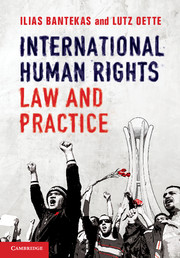Book contents
- Frontmatter
- Contents
- List of abbreviations
- Table of Cases
- Introduction
- 1 International human rights law and notions of human rights: foundations, achievements and challenges
- 2 International human rights law: the normative framework
- 3 Human rights in practice
- 4 The United Nations Charter system
- 5 The UN human rights treaty system
- 6 Regional human rights treaty systems
- 7 Individual complaints procedures
- 8 Civil and political rights
- 9 Economic, social and cultural rights
- 10 Group rights: self-determination, minorities and indigenous peoples
- 11 The human rights of women
- 12 The right to development, poverty and related rights
- 13 Victims’ rights and reparation
- 14 The application of human rights in armed conflict and the international criminalisation process
- 15 Human rights and counter-terrorism
- 16 Non-state actors and human rights
- 17 Globalisation and its impact on human rights
- Index
- References
3 - Human rights in practice
- Frontmatter
- Contents
- List of abbreviations
- Table of Cases
- Introduction
- 1 International human rights law and notions of human rights: foundations, achievements and challenges
- 2 International human rights law: the normative framework
- 3 Human rights in practice
- 4 The United Nations Charter system
- 5 The UN human rights treaty system
- 6 Regional human rights treaty systems
- 7 Individual complaints procedures
- 8 Civil and political rights
- 9 Economic, social and cultural rights
- 10 Group rights: self-determination, minorities and indigenous peoples
- 11 The human rights of women
- 12 The right to development, poverty and related rights
- 13 Victims’ rights and reparation
- 14 The application of human rights in armed conflict and the international criminalisation process
- 15 Human rights and counter-terrorism
- 16 Non-state actors and human rights
- 17 Globalisation and its impact on human rights
- Index
- References
Summary
Introduction
Human rights are constructed by multiple actors acting simultaneously within the given political and legal structures, and challenging and changing them in the process. While the political struggle for human rights is universal and potentially engages all human beings, our focus is on key agents, both the ‘true authors’ of human rights and others who play an influential role. The ‘human rights movement’ includes individuals and communities fighting for their rights, NGOs, the somewhat amorphous ‘civil society’, social movements and transnational networks that engage in local and global power struggles. More recently, the term ‘human rights defenders’ has increasingly become a catch-all category to embrace the range of actors concerned.
The human rights movement is by no means uniform and a series of challenges, both within the movement and in respect of its role as a political actor, have become more pronounced with the increasing power of human rights and its advocates. This development has cast the light on human rights advocates, such as NGOs, and has raised questions both of legitimacy – who are you to make claims in the name of human rights or on behalf of certain people? Are you living up to human rights principles in your own practice? – and effectiveness – are you really making the positive difference in people’s lives you claim to make? Responses to these challenges testify to a growing self-awareness and critical assessment of the nature of human rights work, which includes an evaluation of the efficacy of strategies used to promote and protect human rights. Inevitably, human rights advocates are increasingly drawn into the political domain and are faced with the difficult task of marrying principle with pragmatism. This chapter explores the tensions arising in these contexts and assesses the strategies used by human rights actors, namely documentation, human rights reporting, advocacy, awareness-raising, training and education and, where relevant, litigation (which is considered in more detail in chapters 7 and 13).
- Type
- Chapter
- Information
- International Human Rights Law and Practice , pp. 96 - 144Publisher: Cambridge University PressPrint publication year: 2013



